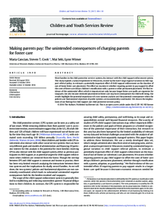Displaying 1641 - 1650 of 2221
This article introduces a youth-reported measure (Essential Youth Experiences [EYE]) developed to assess the experiences of foster youth in their home environment and their critical relationships across a number of service systems.
Within the context of kinship care, the main objectives of this work are to study the characteristics of contact between foster children and their birth parents, and their relationship with key variables of fostering, the children and their kinship caregivers.
This study examines whether requiring parents to pay child support to offset the costs of foster care delays children's permanent placement, whether through reunification with a parent, adoption, or guardianship.
This article is a discussion of the state of foster care for children with disabilities. This study explores three areas related to foster care outcomes: 1) previous disrupted or dissolved adoptions among youth with and without intellectual disabilities; 2) demographic or disability related disparities of youth with intellectual disabilities who were and were not discharged from care; and 3) foster care outcomes of youth with and without intellectual disabilities.
This statistical release provides information about looked after children in England for the year ending 31 March 2016, including where they are placed, their legal status, the numbers starting and ceasing to be looked after, and the numbers who go missing or are away from their placement without authorisation.
The present study offers examination of the association between severity and chronicity of maltreatment history and SU in youth in foster care.
This study used a mixed-methods multiphase, iterative process to illuminate the congruencies and incongruencies between the young adults' accounts of their foster care experiences and the legalistic, system-focused view of their experiences. This study highlights the limitations of administrative data as the primary source for evaluating systems, assessing child well-being, and for understanding child welfare outcomes.
This study used a mixed-methods multiphase, iterative process to illuminate the congruencies and incongruencies between the young adults' accounts of their foster care experiences and the legalistic, system-focused view of their experiences.
This paper discusses the study of foster parent perspectives on decision-making relevant to the use of psychotropics with children in foster care.
This study evaluates one mid-Atlantic state’s implementation of a FGDM called family involvement meetings (FIMs) to improve family strengths and their active engagement in the service planning process.


